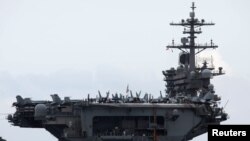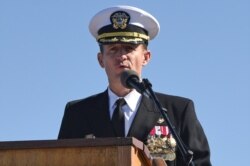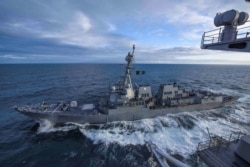The acting secretary of the Navy has called for a more thorough investigation into "unanswered questions" about events aboard the USS Theodore Roosevelt aircraft carrier, as sailors who had been quarantined for weeks returned to the vessel.
“I have unanswered questions that the preliminary inquiry has identified and that can only be answered by a deeper review,” acting Navy Secretary James McPherson said.
The carrier was the first Navy ship to experience a major COVID-19 outbreak at sea, sidelining the vessel in late March.
At the center of the review lies the fate of the Roosevelt’s captain, Brett Crozier, who was removed from his post for raising COVID-19 concerns in an email to superiors.
Media reports have said Chief of Naval Operations Admiral Mike Gilday recommended the unprecedented step of reinstating Crozier. McPherson on Wednesday said he was directing Gilday to expand the Navy’s preliminary report with a follow-on review.
Former acting Secretary of the Navy Thomas Modly, who fired Crozier, resigned after audio was publicly released of him calling Crozier “too naïve or too stupid to be the commanding officer” for sending his letter of concern to at least 20 Navy personnel.
U.S. President Donald Trump declined Wednesday to comment about how he thought the Navy should proceed, but he suggested Crozier was out of line when he wrote the memo.
'Very bad day'
“I don’t know him. I’ve never spoken to him. I think he’s a very, very good man who had a very bad day,” Trump said during a meeting with the governor of Louisiana and members of the White House coronavirus task force.
“And then he wanted to be Ernest Hemingway. You know, he starts writing a long memo,” the president added. “You just can’t do that when you’re the captain of a ship, especially that ship.”
Trump also seemed to suggest that Modly, too, had gone too far.
“I think the [former] acting secretary is a very good man also, and he had a bad day,” he said. “They both had bad days, if you want to know the truth.”
But the chairman of the House Armed Services Committee told reporters Wednesday that much of the blame lay with Trump and the culture being created by the White House.
“I don’t want DoD [Department of Defense] to lose the competence that they have and just become another organization whose job it is to pump up the president’s ego,” said Democratic Representative Adam Smith.
“A way that they could make a strong statement that that’s not where they’re going is to give Captain Crozier his job back,” he added. “From everything that’s come out and everything that I’ve seen, there was no reason to relieve him of his command.”
Supports probe extension
Still, Smith said he supported the decision to extend the probe into how the coronavirus outbreak on the Roosevelt was handled.
At the height of the ship’s outbreak Monday, 955 of the Roosevelt’s nearly 5,000 sailors had tested positive. The Navy said 940 of those were still considered COVID-19 positive and must test negative two consecutive times before being considered free of the coronavirus.
One of the carrier’s sailors died from COVID-19 on April 13.
Sailors who have been quarantined on Guam for weeks started moving back to the carrier Wednesday, a Navy official told VOA.
The move will take at least several days and marks a critical turning point in a situation that has rocked the Navy’s fleet in the Pacific, a major region to U.S. security interests.
On another Navy ship, the USS Kidd destroyer, 64 of its 330 sailors have tested positive. The vessel has now docked in San Diego, according to the Navy.
The Kidd left its port in Hawaii on March 20, Navy officials said. More than a month later, the first sailor showed symptoms, was evacuated and subsequently tested positive for the virus.






